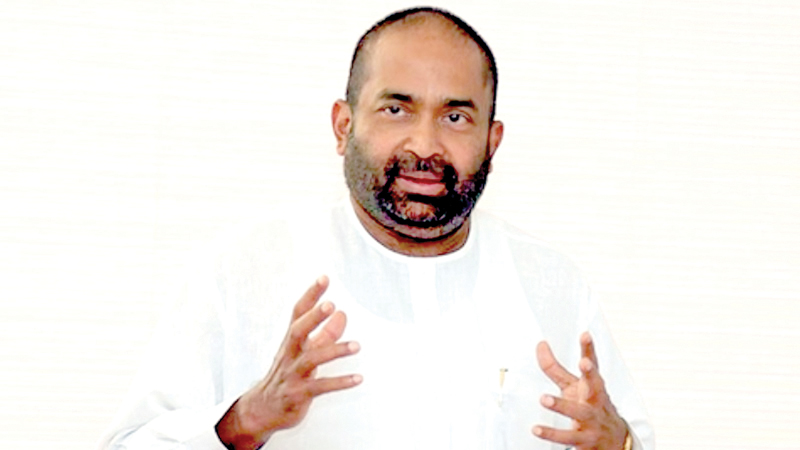
 In an exclusive interview with the Sunday Observer, State Minister of Finance, Ranjith Siyambalapitiya, provides comprehensive insights into tomorrow’s Budget 2024, to be presented in Parliament by President and Finance Minister Ranil Wickremesinghe.
In an exclusive interview with the Sunday Observer, State Minister of Finance, Ranjith Siyambalapitiya, provides comprehensive insights into tomorrow’s Budget 2024, to be presented in Parliament by President and Finance Minister Ranil Wickremesinghe.
Addressing concerns about the high Cost of Living, Minister Siyambalapitiya discusses the intricate challenges in balancing income and expenditure, the strategic measures to address tax losses and fraud, and the collaborative role of the International Monetary Fund (IMF).
Excerpts from the interview
Q: Can the public, who are squeezed on all sides by the high Cost of Living, expect any relief from tomorrow’s Budget 2024?
A: Undoubtedly, formulating a Budget poses an arduous challenge for the Finance Minister, navigating the delicate equilibrium between income and expenditure. In our economic landscape, one persistent issue is that our expenditures consistently surpass our income, with a substantial 95 percent of the Government’s operations funded by taxes.
While the logical recourse to address this imbalance would be to increase income through taxation, such a move encounters its own set of constraints.
Foreign debts remain in the throes of restructuring, further complicating the financial landscape. Locally, reliance on Treasury Bills has become a double-edged sword – in the absence of external buyers, resorting to money printing to cover these debts triggers inflation.
The recent enactment of the Central Bank Act, with its stringent restrictions on such practices, underscores the need to focus on reducing the yawning gap between income and expenditure.
Addressing the plight of citizens, particularly those in the lowest income brackets, the “Aswasuma” program emerges as a social safety net. Reflecting the financial commitment for this initiative, expenditure has surged from Rs. 65 billion in 2022 to a projected Rs. 200 billion in 2024. This substantial increase translates into a threefold rise in the maximum individual disbursement, from Rs. 4,500 to Rs. 15,000. Simultaneously, public servants anticipate a salary hike, while taxpayers voice their plea for relief. Despite the challenges, a qualitative assessment suggests that citizens can find a measure of contentment in their day-to-day lives, although long-term solutions are imperative.
Q: Will the proposed salary hike for public servants materialise through this Budget?
A: President Wickremesinghe’s recent statement indicates a commitment to addressing the pressing issue of public servants’ salaries. Acknowledging the pressures faced by the populace, the President has extended an invitation to the private sector to consider a salary hike as well.
Q: Will there be any announcement through the Budget regarding a new methodology for vehicle imports?
A: The focus on vehicle imports has been a point of contention, with a temporary ban imposed. While this ban was briefly lifted in August for certain public transport vehicles, subsequent considerations led to a reassessment. A Parliamentary Subcommittee was formed to deliberate on the matter, concluding that the existing vehicles, if used efficiently, will suffice for current needs. Importantly, it was noted that the current system allowed for the optimal utilisation of existing buses. Given these considerations, the decision has been made to continue the prohibition on vehicle imports for the time being.
The Government, however, recognizes the complexities involved vis-à-vis global trade and is poised to make decisions that balance short-term challenges with the long-term welfare of Sri Lanka.
Q: Will the budget have any proposals on restructuring State-Owned Enterprises, increasing local production, SME development and so on?
A: With regard to State-Owned Enterprises (SOEs), a significant shift in strategy is underway. Historically, these entities have been safeguarded at a considerable annual cost ranging between Rs. 400-500 billion, derived from the taxpayers. A decisive change in approach is on the horizon, emphasizing partial agreements or joint ventures with private institutions.
While some SOEs may be sold to the public, others may witness a transfer of management to private entities while retaining Government ownership. Alternatively, certain enterprises may see the introduction of private sector stakeholders through share sales. This nuanced approach aims to leverage private sector expertise for the collective benefit of the public, fostering healthy competition and efficiency.
Addressing concerns surrounding local production and SMEs, the Government acknowledges the impact of inflation-induced interest rate hikes. While these measures were instrumental in controlling inflation, they inadvertently burdened SMEs, forcing them to contend with heightened interest rates. Recognising the need for relief, the forthcoming budget aims to alleviate the strain by reducing interest rates from the prevailing 16 percent to a more manageable 10 percent.
Q: The Value Added Tax (VAT) has been increased to 18 percent from next year. Don’t you think that this will add to the burdens placed on the people?
A: The inevitability of taxes as a societal burden is acknowledged, with the Government expressing reluctance over the increase in VAT to 18. The decision to augment certain taxes stems from the economic turmoil prevalent in the country, evident in a 15 percent to 16 percent deficit in tax income compared to projections by December 31. The Government laments the necessity of this VAT adjustment, but underscores the importance of adhering to stringent requirements for economic uplift.
Economic challenges are exacerbated by issues such as the ban on vehicle imports, impacting the ability of Sri Lanka Customs to meet tax expectations. Despite setting targets, the ban has impeded revenue collection. In the light of these challenges, the adjustment in VAT becomes a pragmatic measure to navigate the economic problems effectively. The Government, cognizant of the complexities involved, strives to strike a balance between fiscal responsibilities and the welfare of its citizens.
Q: The Opposition says the budget is virtually being drafted by the IMF. What is your comment on this?
A: It is crucial to contextualise our collaboration with the IMF. Seeking IMF assistance was a strategic decision driven by the imperative for support and guidance from economic scientists and professionals within IMF ranks.
The ongoing partnership is not perceived as a derogation of national sovereignty but rather as a symbiotic relationship aimed at leveraging their expertise for the betterment of our economic situation.
The IMF’s role extends beyond a mere advisory capacity; they actively analyse our progress, providing insights that prove immensely valuable.
Q: Any mechanism being drafted to recover tax losses and tax frauds and also funds stashed abroad by exporters and businessmen?
A: The critical challenge of addressing tax losses, fraud, and the repatriation of funds stashed abroad is acknowledged, not only as a national concern but one faced by countries globally. In our case, the magnitude of the issue is exacerbated by a lack of advanced technology. Recognising this deficiency, Sri Lanka is undertaking the development of a robust mechanism to enhance the recovery of tax losses and combat fraud.
Anticipated to be operational by December, the second iteration of Sri Lanka’s Revenue Administration Management Information System (RAMIS) represents a significant leap in technological prowess.
This digitalised system is poised to alleviate the burden on honest taxpayers while empowering tax authorities to raise revenues substantially. The RAMIS system will encompass monitoring of financial institutions, Customs, and the Excise Department under the Inland Revenue Department (IRD).
With a focus on enhanced data accuracy, the new system is designed to facilitate the identification of tax evaders, ensure compliance, and fortify the overall efficiency of income tax collection.
Q: A recent research found that many budget promises given over the years have not been fulfilled. How are you going to rectify this?
A: Acknowledging the recurrent issue of unfulfilled budget promises, it is imperative to discern between substantive policy measures and proposals that just seek Parliamentary applause. We have established a new National Budget Office for more transparency and accountability. However, it is crucial to note that research institutes may carry inherent biases, and a holistic assessment of our progress is necessary. Despite criticisms, it is undeniable that our current state surpasses historical benchmarks, a reality attributable to the strategic decisions made under President Ranil Wickremesinghe. Choosing pragmatism over anarchy, the nation has averted potential pitfalls, and the trajectory toward progress is discernible even to the casual observer. So we must always embrace a positive narrative , considering the advancements achieved.
Q: Any plans from the Budget to reduce Government expenditure?
A: Efforts to curtail Government expenditure are evident through circulars issued by the Secretary to the Finance Ministry. These directives focus on streamlining control systems, minimising fuel consumption, and reducing communication expenses. Measures include the suspension of public sector recruitment, discontinuation of Government-sponsored events, and a significant reduction in Lotteries Board sponsorships for Ministries.
Q: Was there a positive response from intellectuals, the business community, and the public for submitting proposals for inclusion in the budget?
A: Amidst prevailing economic challenges, the collective difficulties faced by all citizens are recognised. The Government remains steadfast in its commitment to navigating the economic turmoil, and the complexities call for difficult decisions.
President Wickremesinghe’s bold approach in steering the nation through these challenges is acknowledged, particularly in the face of the interplay between tax reduction and salary hikes. Despite the inherent challenges, there is a concerted effort to engage all stakeholders, and the resilience demonstrated by citizens during these trying times is appreciated and it shows the nation’s collective spirit.









